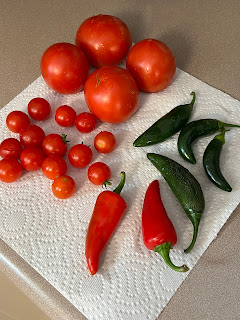The Danger of Deceit!
I am not a gardener, but I do enjoy putting out a few plants in a raised box each season. On the day after Mother’s Day, I set out three tomato plants, a Chile and a jalapeno pepper, along with a small watermelon and squash plant. I wasn’t expecting much, but I love to see things grow. Looking back over these past three months of uneven precipitation, I have been surprised with the fruit that has been harvested from six of the seven of these humble little plants! While the zucchini did not fare so well, the others have produced beyond my expectation!
 |
| Tomatoes and Peppers |
Agriculture metaphors are often used in the writings
of Scripture. Jesus regularly drew out teaching points from the everyday work
of those who tilled the soil in His first century setting. Can you imagine how
engaging and easy the style of the Lord was as He communicated with the common
people of His day? He would begin a parabolic truth with the attention getting
phrase, “Listen! A farmer went out to plant some seed…” (Mark 4:3), and the crowd
would be hanging on every word as He taught them!
On the other hand, the ever-present false teachers
would regularly use deception and deceit in a weak attempt to draw the crowds
to their twisted ideas of faith and life. But Jesus, the One “without any deceit
in his mouth” (Isaiah 53:9b), would masterfully counter with such clarity and
straightforwardness the life-changing truths of God. With such a contrast, it
should have been easy for those listening to tell truth from error. Yet, Jesus
was compelled to remind them, “Beware of false prophets… You can identify them
by their fruit, that is by the way they act… A good tree produces good fruit,
and a bad tree produces bad fruit.” (Matthew 7:15-17, NLT).
Our church small group has been studying the topic, “Finding
the Good Life.” We are taking a “deep
dive” into some passages from the Old Testament for the next six weeks. This
week, as we studied about Jacob and Esau (Genesis 25-33), we were reminded about
the pitfalls and dangers of deceit. The etymology of this word comes from the
Latin, de capere, literally, “to take away” by deception. Deceit tries
to mislead or persuade others with lies.
Jacob was a trickster who, for years, had used deception
to get his way. It would come back to haunt him as Laban, his father-in-law,
would trick him regarding his wives, Leah and Rachel. Jacob would lose his
battle with deceit after a night of struggling with God (chapter 32). It’s an interesting
story that had each in our group thinking about the hurt that family members
inflict on one another!
The lesson is simple: deception is dangerous and
destructive! Lying, half-truths, and selfish ambition undermine good relations.
Deceit is also addictive. Jeremiah the prophet said, “The heart is deceitful
and desperately wicked. Who can know it?” (17:9). Biblical examples like Jacob,
Samson, Goliath, Judas, and the church of Laodicea fell prey to self-deception
and deceit.
One of my favorite Texas authors is rancher, John Erickson, who has written over 75 books about Hank, the Cow Dog! Kids and adults have laughed their way through the exploits of Hank and his sidekick, Drover. Here is a word of wisdom from The Book of Hank that was listed in a recent issue of Texas Monthly, “If you start off on the wrong foot, the footer you go, the wronger it gets!” Jacob went down the road of deception too long!
Since we are known by the fruit of our lives, let’s cultivate the distinguishing fruit of love, joy, peace, patience, kindness, goodness, faithfulness, gentleness, and self-control (Galatians 5:22-23). I believe that God delights in this fruitful harvest!



Very good, wish our family would read this, thank you
ReplyDeleteReminders for many of our families! Thank you for reading!
Delete